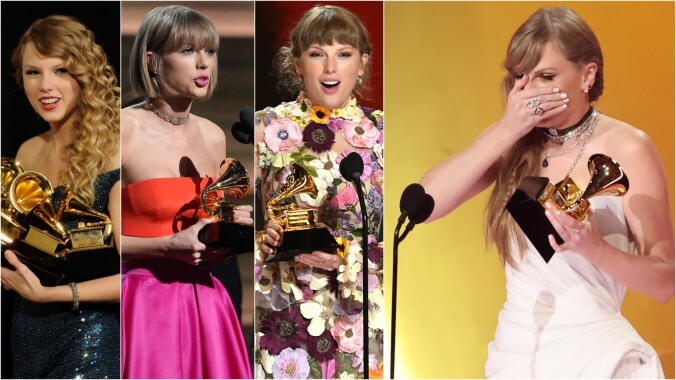Taylor Swift’s historic Grammys win revives some familiar narratives
Taylor Swift made history winning four Album of the Year awards, but it felt like history repeating in more ways than one

On Sunday night, Taylor Swift made history as the only artist ever to win four Album of the Year awards at the Grammys. In her acceptance speech, Swift didn’t focus much on the unique nature of the moment. (“I would love to tell you that this is the best moment of my life, but I feel this happy when I finish a song or when I crack the code to a bridge that I love,” she said, in part.) Instead of coming across as a singular moment in her career and music history, the win for Midnights was a culmination of all the times she’d taken the trophy before. The night carried an echo of the acceptances for Fearless, 1989, and folklore, both in Swift’s actions and the reactions of the viewers.
One aspect was Swift pulling Lana Del Rey onto the stage, despite the latter artist seeming resistant to joining the group. Del Rey is technically one of Midnights’ Album of the Year winners as a “featured artist” on the record (both a songwriter and performer on the track “Snow On The Beach”), but she was also a loser in the category for her own album (Did You Know There’s A Tunnel Under Ocean Blvd). Fans online questioned why Swift was so insistent on having Del Rey next to her: “The way she dragged Lana up on stage made me wanna pass out that’s so embarrassing ahhhh,” writer Bolu Babalola posted on Twitter/X. It was conspicuous, especially combined with Jack Antonoff telling Swift onstage that “Laura’s right here” (in reference to recording engineer Laura Sisk).
In her previous acceptance speeches, the team behind Swift was overwhelmingly male. This was particularly glaring when she accepted the award for 1989 and made an empowering statement to “young women” about not letting anyone else take credit for their successes. Yet the message was undercut by the image: “The first woman to win Album of the Year twice but no women producers standing behind you,” writer Janet Mock tweeted in response to the 1989 speech. Imogen Heap and Sisk were the only other women besides Swift credited for the 1989 AOTY win, but neither were onstage to accept the award that year. Sisk joined the group for Swift’s next AOTY win, folklore; Midnights doubled the number of women on stage by adding Del Rey. Swift would not be caught again in another inadvertent image crisis by snubbing female collaborators. (Instead, she caused an image crisis by inadvertently snubbing Celine Dion.)
There are issues with the Grammys beyond Taylor Swift
But it doesn’t matter how carefully Swift tries to correct the record, because she’ll still be haunted by old narratives outside her control. Hundreds of posts cropped up complaining of Swift’s “fake surprise,” that she was “pretending she’s grateful,” and expressing annoyance at her “shocked face.” This is an accusation that has followed the singer since the early days of her career—essentially since she started winning awards. No matter that no one else has ever won four Album of the Year trophies, making the honor genuinely rather shocking. People have always criticized the way Swift goes about accepting awards, mostly because her reactions just seem to rub people the wrong way. This has been so pervasive that Swift herself parodied it in her “Look What You Made Me Do” video, where different versions of her taunting that she’s “so fake” and couldn’t possibly be that shocked all the time: “Stop making that surprised face, it’s so annoying,” Zombie Taylor snarked.
But the public’s issues with Swift’s Album of the Year wins go beyond simple annoyance. Most of her wins came at the expense of other artists fans saw as more deserving, particularly Black artists: Fearless beat out Beyoncé’s I Am… Sasha Fierce, 1989 topped Kendrick Lamar’s To Pimp A Butterfly, and now Midnights defeated SZA’s SOS. “Black artists, specifically women, can put NUMBERS on the score board, generate entire cultural movements, outperform, and out-talent and still be placed beneath white mediocrity. it’s really a sad thing to witness,” one user posted after the Midnights win, while another wrote, “giving album of the year to midnights over SOS is almost as bad as when harry’s house won over renaissance…like what do black women in music have to do at this point lmfao.”
Much as Swift likes to control her narrative, the way history repeats itself in her Grammy wins is mostly out of her control. And though becoming the first person to win AOTY four times is a unique achievement, it’s also entirely not unique because she’s done it three times before. This fourth Album of the Year trophy exists within the context of the three previous awards, and all those awards exist within the context of her career. Her level of success and acclaim is incomparable and, in some ways inexplicable. No matter what she does, she’s destined to face intense scrutiny just for being the biggest star in the world. It is notable, though, how Swift’s history feels doomed to repeat itself in terms of the Grammys. If you were taking odds, you might count on a backlash brewing the likes of which she once faced after winning for 1989. Swifties did sense the Reputation era was coming, after all.